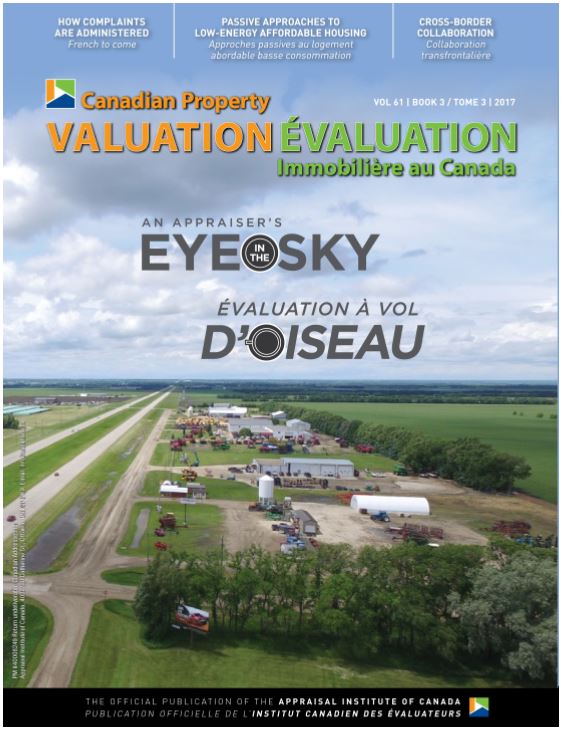Professional Practice Matters: How Complaints are Administered
Canadian Property Valuation Magazine
Search the Library Online
PROFESSIONAL PRACTICE MATTERS
How complaints are administered
We recently published articles giving advice on how to avoid a professional practice complaint. However, if you do enough appraisal work over a long enough time, it is quite likely that someone will launch a complaint against you. Usually, complaints come from the general public, often the owner of the property you appraised, or from lawyers or lenders, other members of the public or sometimes other Members of the Appraisal Institute of Canada (AIC). Complaints can come from your client, the intended user of the report or even from someone who you believe has no right to have seen your report.
First, let us make a point. If you deal politely and professionally with someone who questions the quality or ethics of your work, the likelihood of a complaint can be reduced. If you hear their concerns and make an effort to address their issues, you could very well avoid a complaint.
But not everyone will accept your explanations or corrections, however reasonable, so let’s imagine an instance where a complaint is lodged against you. Let’s imagine this complaint is based on allegations that: 1) your value estimate was wrong by a mile; 2) you chose comparables to make the value as high as you could; and, by the way, 3) you are known to be best friends with the subject property owner.
This article is meant to provide you with an overview of how the complaint may be administered through the AIC Office in Ottawa and then by the volunteers who make up the Professional Practice Committee (PPC). Governance of the PPC is outlined in the AIC’s Consolidated Regulations (2014), Section 5 (https://www.aicanada.ca/aic-consolidated-regulations/). You should review this for more information, particularly if you are ever the subject of a complaint.
After this brief description of the role of each of the PPC participants, we will also make some recommendations as to how you may want to conduct yourself through the process.
AIC participants in the Complaint Resolution Process
The first PPC contact you will have may be with the Director. The Director may send you a letter to inform you that a complaint has been received and provide you with a redacted copy of the complaint. You may be asked to submit a reply to the allegations and copies of your work file and report.
The matter is then referred to the Counsellor, who performs the initial review of the complaint and your work. The Counsellor may wish to interview you and will review the work subject to the complaint and your submissions. If the concerns with your work are technical in nature, he or she may attempt to resolve the issues by providing you with advice or offering you a Sanction Consent Agreement (something like a Guilty Plea Agreement on Law & Order). The Counsellor may close the complaint file if the complaint meets specific criteria.
If the Counsellor determines that the matter, or any other matter brought to light upon review of your work, may be of a serious and/or ethical nature or if you and the Counsellor cannot come to an agreement regarding a Sanction Consent Agreement, the Counsellor may refer the file to a Advocate, who will exercise some of several powers vested in the Advocate’s position.
The powers of the Advocate include: referring the file to the Investigating Sub-Committee for further review; closing the file; offering you a Sanction Consent Agreement; or requisitioning a Hearing of the Complaint before an Adjudicating Sub-Committee Panel. In most cases, the Advocate will speak to you directly throughout the process.
Where a complaint has been referred to the Investigating Sub-Committee, an Investigator will review the file and your submissions and may interview you. There could be many questions from an Investigator including requests for support of your adjustments, discussions of your relationships with the property owner or the complainant, or anything else arising from the work product or complaint.
Upon completion of the investigation, the Investigating Sub-Committee Chair submits a recommendation to the Advocate. Again, the Advocate may close the file, negotiate a Sanction Consent Agreement with you or requisition a Hearing.
If a hearing is requisitioned, the Adjudicating Sub-Committee will form a Hearing Panel to hear and decide on the complaint matter and other matters that may have been uncovered through the process. The Panel can dismiss the complaint(s), impose sanctions and award costs, including such terms and conditions to a decision as may be necessary. Panel decisions are provided in writing and set out the reasons for the decision.
Should you as the Member complained against, or the Advocate on behalf of the AIC, not be satisfied with a decision of the Adjudicating Sub-Committee, an application can be submitted for an appeal to the Appeal Sub-Committee.
If the Appeal Sub-Committee decides that it will hear the appeal, a hearing panel will be formed to hear the appeal and render a decision. The Appeal Sub-Committee may affirm, vary, or quash the Adjudicating Sub-Committee’s decision.
Your response to the complaint
Using the example earlier in this article, the Complainant has alleged that:
- your value estimate was high
- you purposefully chose the wrong comparables
- you are ‘best friends’ with the property owner who would benefit from the high value estimate
- The value estimate is too high
The AIC does not arbitrate value so the allegation about the value estimate being high is not a component of the review. However, the AIC will consider whether your report complies with the Canadian Uniform Standards of Professional Appraisal Practice (CUSPAP) and whether your report meets a ‘reasonable appraiser’ test.
- You purposefully chose the wrong comparables
You provide a copy of your complete work file to the AIC, along with an explanation as to why you chose the comparables you did, why you did not use the comparables the Complainant says you should have, and how you made your adjustments. You should be as forthcoming as possible with information which may assist a PPC representative in assessing your work.
- You are best friends with the property owner
Upon first contact from the PPC, your initial reaction is “What the heck? That guy has no right to even have my report and he has no right to complain about me!” Unfortunately, anyone can complain and every complaint made in writing must be reviewed.
Once you have calmed down, you advise the PPC representative that you are not best friends with the property owner. Rather, you play hockey with him/her on Friday afternoons, a relationship that would not in any way cause you to provide a value opinion to favour his interests. Besides, all parties to the appraisal understood your relationship with the owner before you started the assignment.
Now you recognize that you should have noted in your Certification that all parties to the assignment had acknowledged in advance your relationship with the property owner (refer to CUSPAP 16.7.8). In future, you will be careful to disclose relationships that could cause someone to think you have a conflict of interest. You let the AIC know that you will be changing your practice to address disclosure in reports going forward.
Resolution of the complaint
After receipt and review of your submission(s), the PPC may decide to close the file if the complaint is considered frivolous. If the file remains open, you may receive more calls with more questions. If, after receiving and considering your responses, some concerns remain in the minds of either of the Counsellor, the Advocate or the Investigator (depending on where the file is in the process), then the file may continue through the process as described and you will have decisions to make.
Words of advice
The following words of advice may assist you through the AIC Complaint Resolution Process:
- Ethics Standards Rule #4.3.8 states that It is unethical for a Member to refuse to co-operate with the Institute;
- You must co-operate throughout the whole process or face sanctions for non-cooperation, beginning with suspension and ending with expulsion. Your full cooperation often results in a better outcome.
- The PPC Members other than the Director and Counsellor are (unpaid) volunteers, generally chosen for their experience and expertise and their commitment to improvement of the profession through education and discipline where necessary. The PPC members may have advice on professional practices that can benefit your business and also keep you out of trouble.
- PPC Members dealing with you will avoid handling files where they may have or be perceived to have any conflict of interest with any aspect of the file.
- It is important that you understand and acknowledge the complaint. Along the way, you may understand that you erred and take steps to prevent future errors.
- If this happens, you should discuss it with the Counsellor or the Advocate (depending on where the file is in the process) as proof of your willingness to mitigate the circumstances and prevent re-occurrence.
- If a hearing is requisitioned we urge you to attend the hearing either in person or by teleconference.
- We urge you, at the very least, to make a written submission in response to the Hearing Requisition unless you have an agreement with the Advocate.
Aims of the Complaint Resolution Process
The Complaint Resolution Process is intended to uphold the values of the AIC and its Members, including:
5.1.1 One of the hallmarks of a respected and trusted self-regulated organization is the professional conduct and competence of its members.
And
5.1.4 A primary objective of the Institute’s governance of its Members’ professional practice is to prevent situations that call into question the integrity of Members individually and the appraisal profession as a whole in ways that emphasize heightened awareness of the Members’ professional obligations through education.
Remember this: the PPC is committed to maintaining and improving the work and reputation of the AIC and its members through education and discipline.
We make every effort to be respectful, open, honest and fair in our dealings with our fellow members and with the public. Our hope is that, if you ever find yourself the subject of a complaint, you will find that the people and the process treat you with respect and integrity and that, at the end of the process, you feel that you have learned something that will make you a better appraiser and business person.
For more information, go to one of these links:
https://www.aicanada.ca/industry-resources/addressing-your-concerns/
https://www.aicanada.ca/industry-resources/complaint-resolution-process/
https://www.aicanada.ca/industry-resources/addressing-your-concerns/complaint-resolution-faqs/





